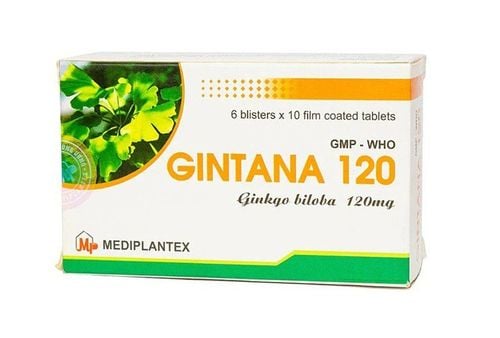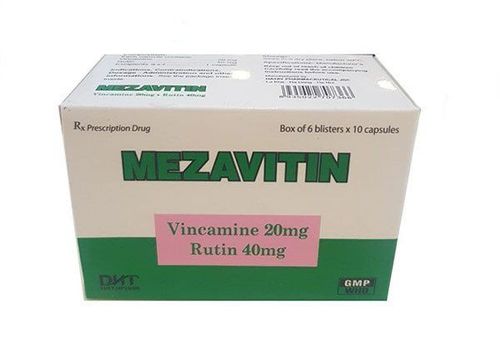This is an automatically translated article.
Sanroza medicine has the main ingredient of dried ginkgo leaf extract, so it is indicated for the treatment of some neurological diseases, especially in the elderly. To ensure effective use and avoid side effects, users should carefully read the instructions and consult a doctor, pharmacist for advice.
1. What is Sanroza?
What is Sanroza drug? Sanroza medicine is a soft capsule that contains herbal active ingredients, of which the main ingredient is dried ginkgo leaf extract. This is a brain and circulatory tonic, so it is indicated for supportive treatment of diseases related to impaired peripheral circulation, cerebral circulation, memory impairment, poor concentration in the elderly.
In addition to the main ingredient is ginkgo leaf extract, in Sanroza medicine also contains excipients such as: Palm oil, Soybean oil, White beeswax, Gelatin, Lecithin, Sorbitol. Glycerin, Vanillin, Methyl paraben, Titanium dioxide, Propyl paraben, Tartrazine Yellow, Brilliant Blue, No. 3 Brown.
2. Indications and contraindications to the use of Sanroza
2.1. Indications Sanroza is prescribed by doctors in the following cases:
Peripheral circulatory disorders: Claudication, Raynaud's syndrome. Patients with memory loss, poor concentration, especially in the elderly. Patients with cerebral circulatory insufficiency, tinnitus, dizziness, poor alertness, dementia, melancholy, motor dysfunction. Eye circulation disorders, eg retinal disease, diplopia, blurred vision. 2.2. Contraindications Sanzora is contraindicated in the following cases:
Pregnant women. The patient is bleeding and has a blood clotting disorder. Sanzor should not be used as a substitute for the treatment of hypertension and should not be used in combination with anticoagulants. Patients with cerebral hemorrhage, acute myocardial infarction and intellectual impairment in children due to incapacity.
3. Usage and dosage of Sanzor
3.1. Sanzor is a film-coated tablet that should be taken orally. To ensure effective use, patients should take the drug with meals.
3.2. The usual recommended dose of Sanzor is to use 1 tablet / time and 3 times a day.
Note: The above dosage of Sanzor is for reference only. Accordingly, the specific dose will depend on the patient's condition, as well as the progress of the patient. To get the most appropriate dose of Sanzor, patients should carefully read the instructions for use or consult a doctor or medical staff.
4. How to handle missed dose and missed dose of Sanzor
Overdose: Currently, there are no recorded cases of overdose Sanzor. However, if the patient uses an overdose of the drug and dangerous complications appear, the patient should stop using the drug and carry out supportive measures and treat complications.
Missed dose: If the patient forgets a dose of Sanzor, it should be taken as soon as he remembers. However, if the time to forget Sanzor with the next dose is too short, the patient should skip the missed dose and continue taking the new dose of Sanzor as usual. Do not take a double dose to make up for a missed dose.
5. Side effects when using the drug Sanzor
When using Sanroza, patients may experience undesirable effects on the organ systems as follows:
Digestive: Digestive disorders. Skin: Itching, Urticaria Nervous: Headache, dizziness When experiencing side effects of Sanzor, the patient should stop using it, and at the same time notify the doctor or immediately go to the nearest medical facility for treatment. timely examination and treatment.
6. Notes when using Sanzor
In the process of using Sanzor, patients should pay attention:
Patients should note that Sanzor is not a blood pressure medication, so it cannot replace specific treatment. Ability to drive and use machines: Sanzor does not affect the ability to drive or use machines. Pregnancy: Sanzor is contraindicated for use in pregnant women, because the safety level has not yet been established for use in pregnant women. Lactation: As with pregnancy, there are currently no adequate data on the use of Sanzor in nursing mothers. Therefore, breastfeeding women should not take this medicine.
7. Sanzor drug interactions
When using a combination of drugs, there may be interactions that affect the treatment process. Therefore, when using Sanzor, you need to avoid concomitant use with the following drugs:
Anticoagulants Antithrombotic drugs Arginin, Anticoagulants warfarin, heparin Anticoagulants (blood thinners). In order to avoid drug interactions, patients need to inform their doctors and pharmacists about drugs, herbs, and dietary supplements so that the doctor can prescribe appropriate drugs.
In summary, the drug Sanroza has the main ingredient is ginkgo leaf extract, so it is indicated for the treatment of some neurological diseases in the elderly. To ensure effective use and avoid side effects, users should carefully read the instructions and consult a doctor, pharmacist for advice.
Please dial HOTLINE for more information or register for an appointment HERE. Download MyVinmec app to make appointments faster and to manage your bookings easily.













